Jethro Tull
Hit Parader [October, 1969] Reprint from 1978
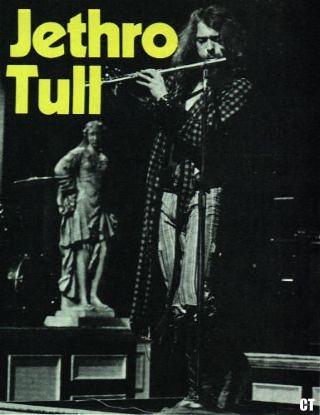 More than two centuries
ago, an Englishman named Jethro Tull, departing from this life, left us
two legacies: the horse - drawn plow (or plough), if you will ,which he
is said to have invented, and his name which is now borne forth from old
England by one of the latest and greatest of their stellar musical exports.
More than two centuries
ago, an Englishman named Jethro Tull, departing from this life, left us
two legacies: the horse - drawn plow (or plough), if you will ,which he
is said to have invented, and his name which is now borne forth from old
England by one of the latest and greatest of their stellar musical exports.
Old Jethro's modern
namesake is a four-man band which generally plays down the blues sound,
so universally affected by the newer British groups, in favor of a thing
of their own. You might call it jazz-rock; surprisingly, the group doesn't
object to such labeling. But mostly it's Ian Anderson, the flute - player
and vocalist who dominates the sound with his sophisticated yet most energetic
style, and the stage act with his incredible motion. The group's Reprise
lp, This Was, is an entertaining piece of sound, one which doesn't attempt
to be a summation of the world's musical experience, or to be the ultimate
destruction of man's thinking capacities. It reflects the influence of
some other great musicians, chiefly the unique jazzman Roland Kirk. But
it moves very nicely and unpretentiously in its own groove.
The aforementioned
Ian Anderson is also Jethro Tull's self - appointed spokesman, facing alone
all the hordes of writers and interviewers while Martin Barre, Clive Bunker
and Glenn Cornick, one assumes, soak up the California sunshine. So it
was Ian who came to our place one warm March day, functionally dressed
in what might well pass for the garb of an 18th century ploughman. A university
graduate, he turned out to be a very articulate gentleman, so much so that
this writer was hardly able to get a word in! And now the tape machine
spins forth the thoughts and words of Ian Anderson.
"I am spokesman for
the group only because I am more articulate. It's just very, very difficult
to talk to people, particularly when they're journalists. Nowadays there's
such a tendency to be drawn into rather elevated issues, getting into discussions
about politics and sex. It's very easy for people to be drawn into these
discussions and say their own little bit. By my doing the talking, we just
don't talk about it all. The whole thing is a lot of rubbish. I don't believe
I have any responsibility to the kids to preach any feelings I have on
these sort of subjects. I don't know anything about them. I know nothing
about war or politics or anything else.
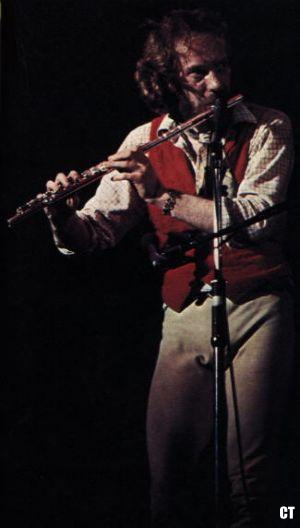 HP. Well, let's talk about music then. What are some of your reactions
to playing for people in America, as opposed to England!
HP. Well, let's talk about music then. What are some of your reactions
to playing for people in America, as opposed to England!
IAN: There isn't actually
a lot of difference when it comes down to playing in front of people...
The only really obvious difference that I've come across is that people
here seem to want to get away with things, which is a little bit disturbing
to me. I've been used to playing to people who are neither super - conscious
or aware, or in any way less conscious or aware, than they would be at
any time during the day, doing whatever they do in the daytime. It's a
little disturbing playing to people who are, to quote, turned on. It's
difficult to know how to play to them. It's disturbing to know that they
must to some extent imagine that I personally, and the other fellows in
the band, are just the same as them, y'know.
As for some of the
music I've heard here ... Blood Sweat & Tears I like very much. Paul
Butterfield. I like those bands because they're disciplined bands. When
you listen to them you feel you're hearing the results of people having
taken a lot of time and trouble to do a thing well, accurately, tastefully,
thoughtfully. It's good to be given that sort of a pleasantly wrapped package.
After having paid money to sit and listen, it's a good feeling. I probably
say this because we do the other thing, by and large. We do a lot of improvised
things that some nights are rubbish and some nights are good. You feel
that Blood Sweat and Tears is a constant good thing. I don't revel in the
music, the individual songs, the style particularly. I like some of the
things they do, but it's just the overall presentation of the whole thing
that's so professional, and very good to listen to. It gives me a good
feeling 'cause it's so disciplined. I liked disciplined music, because
it's something I don't have.
I've listened to some
jazz, but never really taken it in, because it always is way beyond me
technically. I can't think chords that fast, and I can't play the changes
like those people do. They move with the chords so quickly, they know every
note on the instrument. Whatever I play, it's because I'm making the most
of what I know. I'd rather be tasteful than fantastic and clever.
I don't mind when people
call our music "jazz - rock" if that's the way they see it. Fair enough.
People can call it whatever they want to call it. The only thing that would
worry me is if they say it was badly played. I'm anxious to please mostly.
Basically I like to please people. I know I can't please everyone, but
it's important to me to try. I sort of compromise between pleasing myself
and pleasing the people, because know I couldn't do either one perfectly.
If there's something I do that I don't really like doing very much, but
I know the people like it, I don't mind being swayed -by that. don't think
that's a bad thing. I have enough of a sort of total power, when I want
to, to last me. I don't have to be able to play everything I want to play.
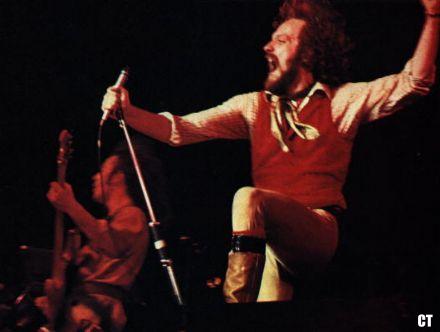 HP: Let's talk about that "total power. " Many people have spoken of how
much power rock musicians have over people.
HP: Let's talk about that "total power. " Many people have spoken of how
much power rock musicians have over people.
IAN: It'd be nice to say
something that would start people too ... kick people up off their bottoms
and make them sort of sit up and think ... be nice to play pop stars again,
you know. Driving Rolls - Royces and Cadillacs and flying around in balloons.
All the pop stars in England used to do strange things from time to time.
People like The Who, y'know, sort of ravers who went to clubs, destroying
bars and things, getting in fights.
They'd maintain their
image offstage, in ways that would make the papers. It was really quite
cute. They hardly do that any more. Everybody now is picking flowers. It's
OK, a sign of the times. I never went through that pop star thing. I just
heard about it. I live in an age of pacifiers -- people who want to say
about everything, "Oh, that's cool." That sort of what everybody wants
everything to be. I never did rip up seats in trains and things. I really
do wish we could do something sort of wild and abandoned, like the pop
stars did. Be nice to put the spice of life back into the pop business.
It was phony, but it
was a valid thing. Really, looking back on it, it was sort of an honest
way of asserting your position in life. I intend to be very aggressive
in some ways, sometimes. Everybody's sort of going around now and saying
let's be vulgar and obscene. It's the revolution thing. But that isn't
the sort of aggression I'm talking about. I'm talking about being aware
of things. The whole point of the revolution thing is just an offshoot
of the whole hippie thing anyway, the aggressive side of it.
There isn't really
much I can do to take advantage of my position. It doesn't help much; in
fact it makes life harder. All there is for me is the actual moment of
playing on stage. Sometimes it's tragic. Sometimes you come off and want
to cry. Other times you come off and you feel good, you know. People have
enjoyed something you have done. You enjoyed doing it and got some money
for it. The money's pretty important, suppose, though, have yet to see
much evidence of it. Most groups lose money coming to America. A lot of
expenses you don't realize are expenses, till you see that nobody's going
to pay for it except you. If you want profit, you can always try to find
it in the half percent that's left. It's much more profitable for us at
the moment to play in England.
But it's even worse
for American groups over there than it is for us here, because they cannot
earn money, y'know. That English money isn't worth much, really. The only
thing an English tour is worth for an American group is selling that extra
few thousand records, which is all it could mean to them. It's a sort of
prestige thing, having tied up another country. Consider that selling thirty,
forty thousand records in England can get you into the Top Ten of albums;
that amount means nothing in the States. American groups could do just
as well by doing a little more work over here. An unknown American group
In England couldn't earn much. The Iron Butterfly would be worth a hundred
quid a night over there right now ($240-ed.) But they want to do it, and
they're coming. They're doing a tour with us, in fact.
Most English groups
want to come to America; they have to, if they want to make any more than
just a reasonable sort of living. You got to be right at the top to make
a lot of money in England. But England is still more important to me. The
people, I understand 'em;
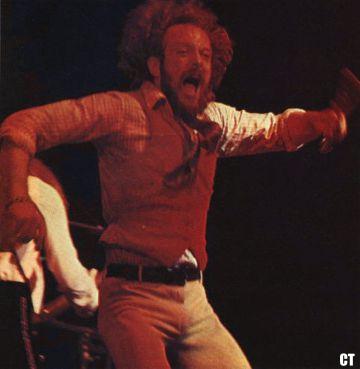 I feel a sort of sympathy for the people. can understand what makes them
laugh, what they like and dislike about music. I don't say they're a better
or worse audience, but I do know them. I don't like to offend people, and
I do a lot of that over here in the States. It's a little bit upsetting
not understanding people. I like it here, look forward to coming back,
because it's a sort of a challenge. have got to change, which is something
should accept, go about it in a slow careful way. I do like it.
I feel a sort of sympathy for the people. can understand what makes them
laugh, what they like and dislike about music. I don't say they're a better
or worse audience, but I do know them. I don't like to offend people, and
I do a lot of that over here in the States. It's a little bit upsetting
not understanding people. I like it here, look forward to coming back,
because it's a sort of a challenge. have got to change, which is something
should accept, go about it in a slow careful way. I do like it.
HP: Are you going to
make another lp soon!
IAN: We're doing it
the first two weeks after we return to England. It'll be a little different.
Our music has changed. I've written some more that's all there is to it.
It's not a conscious attempt to progress. Technically you progress, what
you're capable of doing, your ability to write songs, arrange songs, progresses.
The songs are just new songs, just a reflection of the times since I last
wrote a bunch of songs. Now of course there'll be a change because Mick
Abrahams (guitarist on This Was-ed) isn't there any more. He's gone. He
was getting a bit difficult to work with. Not in terms of musical aspirations
-- just in terms of business ideas, management ideas.
Personality - wise,
there was always a bit of a clash. He didn't want to come to America; he
didn't want to work seven nights a week; he didn't want to be a pop star,
so he had to go. We got someone else -- Martin Lancelot Barre. We picked
somebody who could play pretty much in the style of the other guitarist.
Because we didn't want it to be some sudden jump in terms of our overall
sound. But he's a good person to work with, get along with. Coming into
the group at this stage made him suddenly aware of the fact that he's got
to work really hard, really do something to justify his being with the
band. A good thing. It's nice to have people who are on their toes.
The next album will
have some of the things we're doing on stage now, probably half of them.
There'll be a few more which are things we're not doing on stage they'll
be treated as a sort of recorded kind of music as opposed to the sort of
thing we play. They'll be in the same sort of sound, but we'll get into
production techniques more because we know more about it than we did. We
can afford to take chances now, looking for the best way to achieve good
recorded sound in terms of listening to stereo. But we also want to get
as near to the style of the group on stage as we can. It takes months to
find out, trial and error - wise, what is the best sort of program.
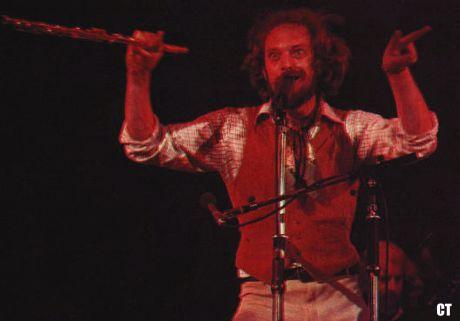 We'll be using 8-track for the next album; it gives a lot more freedom
when it comes to stereo. Our first album was all done on 4 track, drums
and bass and sometimes guitar always on the same track, which is terrible
when it comes to a stereo mix.
We'll be using 8-track for the next album; it gives a lot more freedom
when it comes to stereo. Our first album was all done on 4 track, drums
and bass and sometimes guitar always on the same track, which is terrible
when it comes to a stereo mix.
HP: Well, that's very
interesting. Nice talking to you. (Etc.)
IAN: Well, if you want
to know more you can always read the press releases anyway. Some of these
are quite funny. Most of the interviews you read, you know, are really
very asserting of the interviewer's personality. It's very interesting
to read them when you know the bloke. Different strange people, some of
them are very ordinary people, all have their own way of writing, make
it their own particular way of doing it. I haven't read any interviews
I've done.
Written by: unknown
 More than two centuries
ago, an Englishman named Jethro Tull, departing from this life, left us
two legacies: the horse - drawn plow (or plough), if you will ,which he
is said to have invented, and his name which is now borne forth from old
England by one of the latest and greatest of their stellar musical exports.
More than two centuries
ago, an Englishman named Jethro Tull, departing from this life, left us
two legacies: the horse - drawn plow (or plough), if you will ,which he
is said to have invented, and his name which is now borne forth from old
England by one of the latest and greatest of their stellar musical exports.
 HP. Well, let's talk about music then. What are some of your reactions
to playing for people in America, as opposed to England!
HP. Well, let's talk about music then. What are some of your reactions
to playing for people in America, as opposed to England!
 HP: Let's talk about that "total power. " Many people have spoken of how
much power rock musicians have over people.
HP: Let's talk about that "total power. " Many people have spoken of how
much power rock musicians have over people.
 I feel a sort of sympathy for the people. can understand what makes them
laugh, what they like and dislike about music. I don't say they're a better
or worse audience, but I do know them. I don't like to offend people, and
I do a lot of that over here in the States. It's a little bit upsetting
not understanding people. I like it here, look forward to coming back,
because it's a sort of a challenge. have got to change, which is something
should accept, go about it in a slow careful way. I do like it.
I feel a sort of sympathy for the people. can understand what makes them
laugh, what they like and dislike about music. I don't say they're a better
or worse audience, but I do know them. I don't like to offend people, and
I do a lot of that over here in the States. It's a little bit upsetting
not understanding people. I like it here, look forward to coming back,
because it's a sort of a challenge. have got to change, which is something
should accept, go about it in a slow careful way. I do like it.
 We'll be using 8-track for the next album; it gives a lot more freedom
when it comes to stereo. Our first album was all done on 4 track, drums
and bass and sometimes guitar always on the same track, which is terrible
when it comes to a stereo mix.
We'll be using 8-track for the next album; it gives a lot more freedom
when it comes to stereo. Our first album was all done on 4 track, drums
and bass and sometimes guitar always on the same track, which is terrible
when it comes to a stereo mix.